
An important milestone for the NHS — including on the Isle of Wight — will take effect from tomorrow (Friday). But what will that mean for us?
Sweeping government changes have been branded a new era for healthcare, by senior medical executives, paving the way to transform how services work.
Following years of development and the passing of the Health and Care Act 2022, earlier this year, 42 integrated care systems will officially start operating.
For Islanders, it will see the end of the Hampshire, Southampton and Isle of Wight Clinical Commissioning Group (CCG) — which only came into force on April 1, last year, after the Isle of Wight CCG merged with mainland groups.
It will be replaced by the Hampshire and Isle of Wight Integrated Care System (ICS).
But what does that mean, what will happen and what should we expect?
What is an integrated care system?

An ICS will coordinate services and aims to remove barriers between organisations, to deliver better, joined-up care for patients.
In turn, it is hoped that will improve health outcomes, reduce inequalities, improve value for money and help the NHS support broader social and economic development.
The Hampshire and Isle of Wight ICS will serve nearly two million people, supported by 77,500 health and care staff with a budget of £3.6 billion.
To help deliver the ICS, it will comprise two main parts — an Integrated Care Board (ICB) and Integrated Care Partnership (ICP).
How will it be managed?
The ICB will run and monitor the organisation.
It will be the statutory organisation responsible for ensuring the ICS is meeting its statutory duties.
The ICB will manage the funding, develop strategies and commission services to meet the health needs of the population.
Leading officials, such as a chief executive (Maggie MacIssac), medical officer (Dr Derek Sandeman), finance officer (Roshan Patel) and board chair (Lena Samuels) have already been appointed.
The ICB will also have input from all the NHS Trusts in the region, including the Isle of Wight, Solent and Portsmouth Hospitals University.
When the ICB is legally established, the CCGs will be abolished under the Health and Care Act.

What is an Integrated Care Partnership?
The ICP is a statutory committee, formed between the ICB and all upper-tier local authorities — in this instance the councils for Hampshire, Portsmouth, Southampton and the Isle of Wight.
It will be responsible for producing a strategy on how to meet our health and wellbeing needs.
What are the benefits?
According to the NHS, there are six main benefits:
- Improving the health of children and young people.
- Supporting people to stay well and independent.
- Acting sooner to help those with preventable conditions.
- Supporting those with long-term conditions or mental health issues.
- Caring for those with multiple needs as populations age.
- Getting the best from collective resources so people get care as quickly as possible.
Will it be a good thing for the Island?
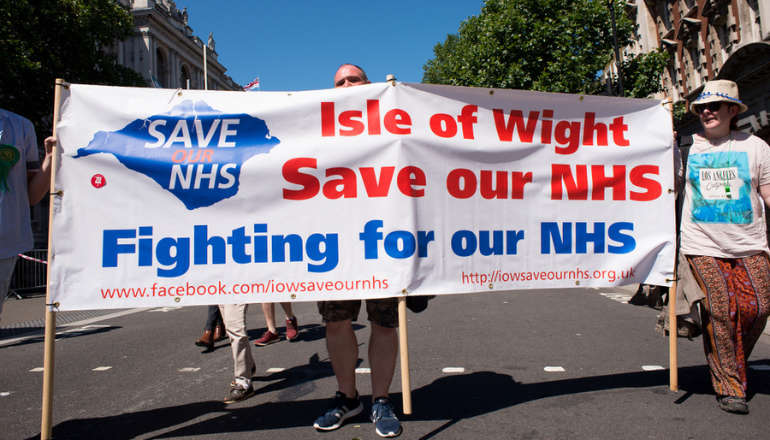
That depends on who is telling us about the new system…
Within the ICS, there will be ‘place’-based partnerships, focusing on local areas, which will lead the detailed designs and delivery of services across their communities.
These partnerships will involve the NHS, local council, community and voluntary organisations, residents, service users, carers and anyone else in the community.
One potential positive outcome of the ICS, leading Island figures hope, will be a solution to the dental crisis currently facing residents.
With the commissioning of dental services being handed over to the ICS, it has been said more innovative ways of thinking can be introduced to find better, more practical solutions that fit the Island — instead of a one-size-fits-all approach.
Will it impact GPs?

Not day-to-day, but GPs could use their local knowledge to help future planning – for example in places where community need is different to what’s already on offer.
Using their experience, doctors and other medical professionals in primary care will also play a crucial role in identifying ways to tackle health inequalities in the communities they serve.
GPs and the primary care networks will be represented on the ICB by Dr Michele Legg, a GP on the Island who has also been clinical chair of the CCG, and Dr Matt Nisbet a GP in Basingstoke.
What are key priorities of the ICS?
Before it has even officially started, some key priorities have been set out for the different directors of the Hampshire and Isle of Wight ICS.
They include:
- Transformation programmes in cardiovascular disease prevention, frailty and childhood trauma
- Delivering this year’s financial plan and developing long-term financial and sustainability plans, including on for the Island
- Recruiting and embedding 1,200 international nurses into the ICS workforce
- A programme of workforce transformation
- The alignment of the ICS to a five-year strategy
- Delivery of urgent, emergency and planned care programmes, winter plans and primary care programmes.

 Isle Of Wight College Firearm Report Sees 17 Year-Old Arrested In Cowes
Isle Of Wight College Firearm Report Sees 17 Year-Old Arrested In Cowes
 Major Island Policy Forum To Consider Plans Aiming To Make Suicide Prevention 'Everybody's Business'
Major Island Policy Forum To Consider Plans Aiming To Make Suicide Prevention 'Everybody's Business'
 Latest Scam Warnings Issued For Isle Of Wight
Latest Scam Warnings Issued For Isle Of Wight
 First Acts Announced For Cowes Fringe 2025
First Acts Announced For Cowes Fringe 2025
 Six Island Charities Supported By WightAID In Final Giving Round Of 2024
Six Island Charities Supported By WightAID In Final Giving Round Of 2024
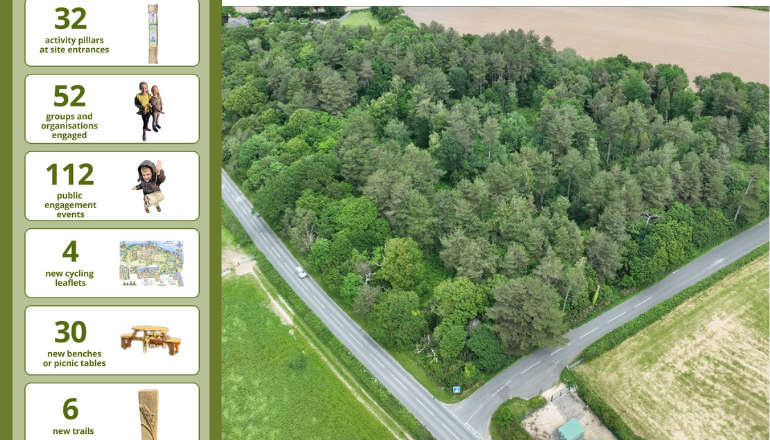 Two New Sites For Isle Of Wight's Gift To Nature
Two New Sites For Isle Of Wight's Gift To Nature
 Councillors Lodge Motions Ahead Of Landmark School Closures Debate
Councillors Lodge Motions Ahead Of Landmark School Closures Debate
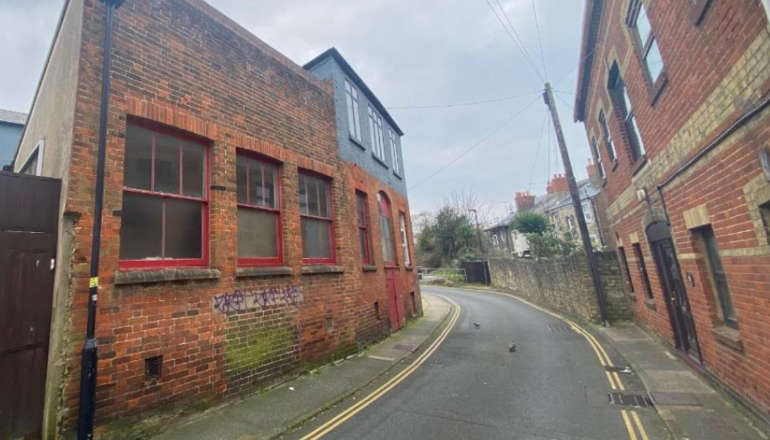 Ryde Town Centre Victorian Warehouse Could Get Three New Flats
Ryde Town Centre Victorian Warehouse Could Get Three New Flats
 Controversial Bid To Build Renewable Energy Park Near Island Village Re-Emerges
Controversial Bid To Build Renewable Energy Park Near Island Village Re-Emerges
 East Wight Road Improvement Work To Take Place In February
East Wight Road Improvement Work To Take Place In February
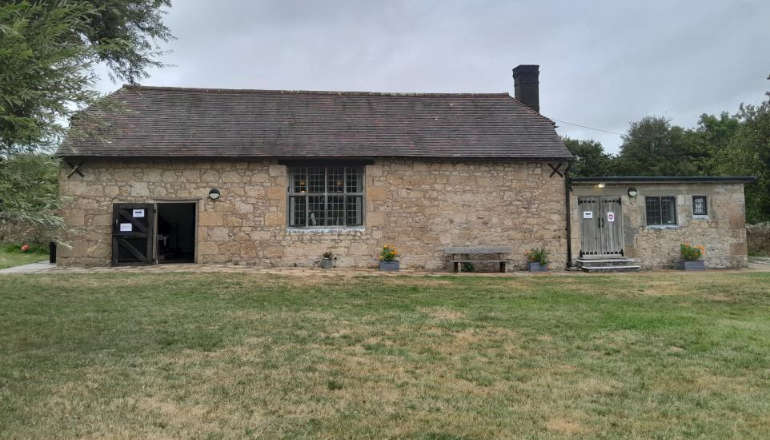 Island Parish Council Loses Second Clerk In Less Than A Year
Island Parish Council Loses Second Clerk In Less Than A Year
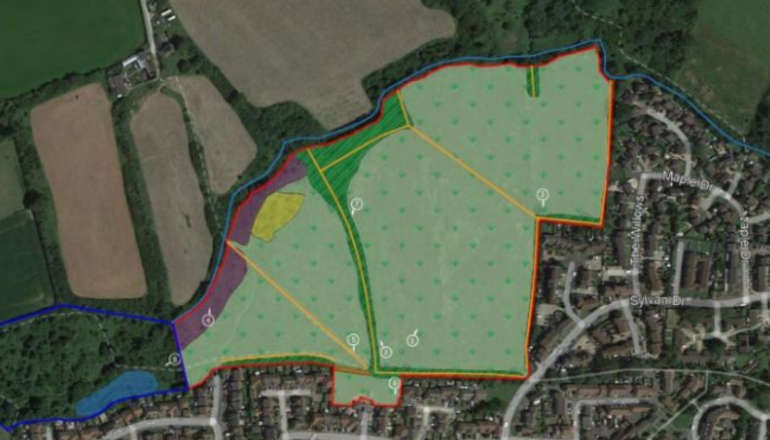 Heavily Criticised Newport Edge Of Town Housing Plans Resurface
Heavily Criticised Newport Edge Of Town Housing Plans Resurface
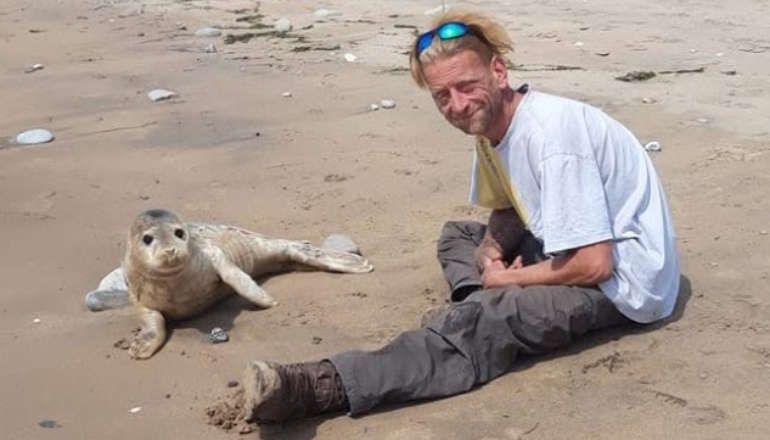 Family Pays Touching Tribute To Sandown Man Killed In New Year's Eve Collision
Family Pays Touching Tribute To Sandown Man Killed In New Year's Eve Collision
 Floating Bridge To Remain Out Of Service Until Later This Week Due To 'Faulty Battery'
Floating Bridge To Remain Out Of Service Until Later This Week Due To 'Faulty Battery'
 New Date Announced For Rescheduled Sandown Fireworks
New Date Announced For Rescheduled Sandown Fireworks
 Council Chairman Honours Student's Artistic Achievement At St Thomas Of Canterbury Primary School
Council Chairman Honours Student's Artistic Achievement At St Thomas Of Canterbury Primary School
 Pan Muga Set To Reopen For Newport Community
Pan Muga Set To Reopen For Newport Community
 Squally Showers Today, Showery Rain Tomorrow - Strong Winds Throughout
Squally Showers Today, Showery Rain Tomorrow - Strong Winds Throughout
 Progress Made On New GP Surgery Plans To Support Island Residents
Progress Made On New GP Surgery Plans To Support Island Residents
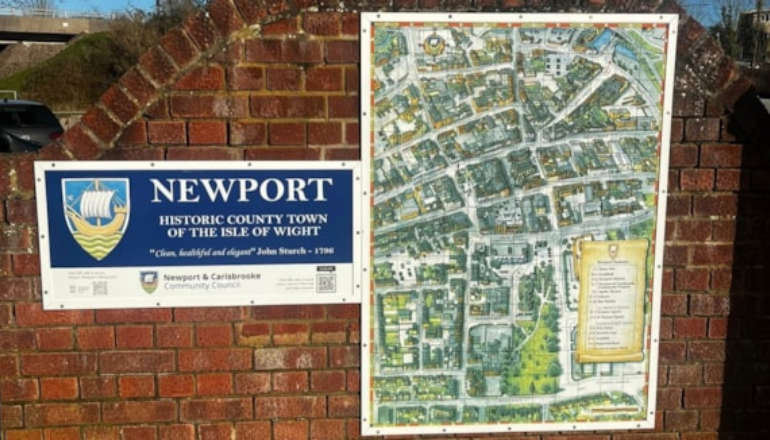 Heritage Action Zone Funding Sees New Town Maps Installed Around Newport
Heritage Action Zone Funding Sees New Town Maps Installed Around Newport


